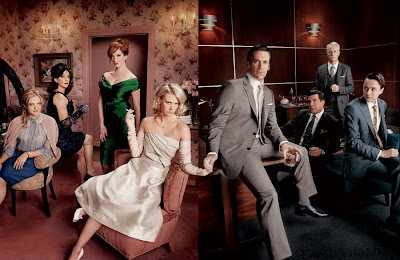 |
| The cast of Mad Men — aren’t they lovely? |
There are two significant moments in Mad Men when nostalgia is overtly discussed. The first comes in season one, episode thirteen (“The Wheel”). Don/Dick has just learned that his brother committed suicide, and he brings his feelings about his own past—particularly his strong desire to construct a past that erases the Whitmans—to sell a product. In a pitch to Kodak, for a campaign to sell a storage device that holds slides and allows you to click through them, he says,
Technology is a glittering lure, but there’s the rare occasion when the public can be engaged on a level beyond flash, if they have a sentimental bond with the product. My first job, I was in house at a fur company with this old pro copywriter–a Greek, named Teddy. Teddy told me the most important idea in advertising is “new.” It creates an itch. You simply put your product in there as a kind of calamine lotion. But he also talked about a deeper bond with the product: nostalgia. It’s delicate, but potent. Teddy told me that in Greek, “nostalgia” literally means “the pain from an old wound.” It’s a twinge in your heart far more powerful than memory alone. This device isn’t a spaceship, it’s a time machine. It goes backwards, and forwards… it takes us to a place where we ache to go again. It’s not called the wheel, it’s called the carousel. It lets us travel the way a child travels – around and around, and back home again, to a place where we know are loved.
It’s a lovely pitch (which sends Harry, who was recently kicked out of his home for cheating, out of the room in tears) and an effective one: Don seals the deal. (
Watch the clip here.)
In season four, episode six (“Waldorf Stories”), Don–drunk on booze and ego after his CLIO award win–recycles his “nostalgia pitch” for Life Cereal and the proposed “Eat Life by the bowlful” campaign.
But I keep thinking about, you know, nostalgia. How you remember something in the past and it feels good, but it’s a little bit painful. Like when you were a kid.
One can surmise, if at all familiar with Don’s state of mind and lifestyle at this point, that this pitch doesn’t go as well. The meeting is a mess, and Don inadvertently pitches someone else’s idea as his own. (I couldn’t find this clip available online.)
These are two brilliant, meta moments in a show that is, in some ways, all about nostalgia. If we think of the show itself as a product, it works on both levels described in Don’s eloquent pitch. For viewers who didn’t live through the sixties, the show provides a uniquely detailed window on an era we never experienced and may only vaguely know, and the culture has produced plenty of “calamine lotion” for this group. For those who lived through the sixties, the show itself can be the Kodak carousel–taking viewers to that place they may ache to go again: their own past.
The above barely scratches the surface of the cultural and commercial impact of Mad Men. You could virtually live your life as a Mad Men character. But why?
A major theme in Mad Men is gender, and it is one of the few shows on television that overtly critiques institutionalized sexism—and we can even, justly, call the show feminist. Here’s what I fear may also be happening: in a culture that claims to be post-feminist, post-ironic, and even post-racial, in which social justice movements lack unity, and even many educated people believe women have achieved “enough” equality (enough, at least, to no longer fight for our basic rights like access to health care and equal pay), aren’t people also maybe a little bit, even unconsciously, nostalgic for a time of clearer definitions? While I would never argue that anyone would want to return to gender and/or racial dynamics of the early 1960s, shouldn’t we attribute at least some of the show’s success to the conservative desire to ‘return to a simpler time?’ Is it not possible that we have an unconscious (or even subconscious) desire to return to a place where we can clearly point to a behavior and call it like it is: Sexist. Racist. Homophobic. Wrong.
In a culture where third-wave conflicts with second wave, where there is a conservative-led war on women’s access to health care and bodily autonomy that the liberal party largely ignores, in which the celebrity status of a couple of female politicians (who happen to hold extremely regressive positions on issues affecting women) passes as achievement of gender equality, in which women have suffered greatly in a recession dubbed the “Mancession” by media, wouldn’t it be nice if things were a bit clearer? Doesn’t our society wish we could call it in real life like we call it on that show? And don’t we also enjoy that feeling of superiority–that we’re oh-so enlightened compared to the barbarous behavior of those characters–when in reality things haven’t changed as much as we’d like to think?
In a show that quietly argues that sexism and misogyny severely harm women and men, what do we make of all the damn cultural imitation? Where and how do we draw the line between admiring and desiring the surfaces (the clothes, the decor, the general air of coolness), and wanting what’s underneath?


Brava on all the wonderful Mad Men essays, Bitchflicks! Wonderful stuff! And I hear what you’re saying about the Banana Republic Mad Men line, etc. Capitalism. Capitalism. It eats up everything, even the well-intentioned stuff. It even ate up punk rock. Sigh.